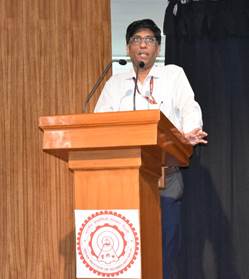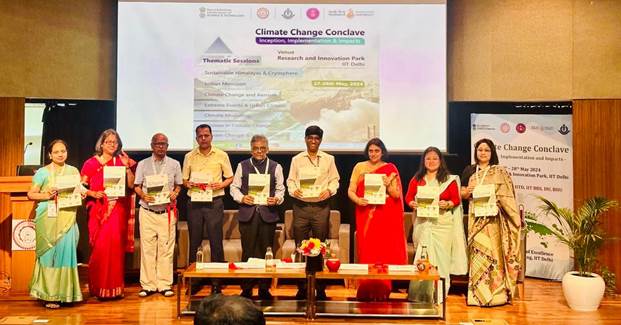DST Hosts Climate Change Conclave at IIT Delhi
Two-Day Event Focuses on AI Models, Data Quality, and Climate Adaptation
New Delhi, May 28, 2024: The Department of Science and Technology (DST) organized a two-day Climate Change Conclave from May 27-28, 2024, at the Indian Institute of Technology (IIT) Delhi. The event convened experts nationwide to discuss the development of foundational Artificial Intelligence (AI) models for climate modeling tailored to the Indian context, the enhancement of data quality control, and the improvement of climate predictions. Additionally, the conclave emphasized strengthening interactions with communities to develop better climate adaptation solutions.

DST Hosts Climate Change Conclave at IIT Delhi
Two-Day Event Focuses on AI Models, Data Quality, and Climate Adaptation
Keynote Addresses and Highlights
Prof. Abhay Karandikar, Secretary of DST, inaugurated the conclave, highlighting the achievements of the National Mission for Sustaining Himalayan Ecosystem (NMSHE) and the National Mission on Strategic Knowledge for Climate Change (NMSKCC). He emphasized the importance of developing AI models suited to India’s specific needs. Releasing the draft executive summary of the ‘District Level Climate Risk Assessment for India,’ Karandikar noted that indigenous climate models would provide a better understanding of addressing climate change. He stressed the importance of a holistic approach involving interdisciplinary researchers and stakeholders to tackle the challenges of climate change, particularly its impacts on agriculture, water, and the environment.
Contributions from Leading Experts
Dr. Akhilesh Gupta, Senior Advisor at DST, reflected on the evolution of DST’s Climate Change Programme and its contributions to the National Action Plan for Climate Change (NAPCC). He underscored the need for collaborative efforts to secure the future for coming generations, urging communities to work together on actionable solutions.
Dr. Anita Gupta, Head of Climate, Energy, and Sustainable Technology (CEST) at DST, stressed the urgency of addressing climate change, noting that 40% of the world’s population is already vulnerable to its adverse effects. She outlined DST’s efforts under NAPCC, supporting numerous R&D programs aimed at developing climate solutions. Gupta also highlighted DST’s participation in Mission Innovation, a global initiative launched in 2015 to foster clean energy solutions.
Prof. Rangan Banerjee, Director of IIT Delhi, showcased the Centre of Excellence on climate change modeling at IIT Delhi. He detailed innovative mitigation technologies being developed, such as coal-to-methanol conversion, blue hydrogen production, and carbon capture and storage.
Broad Participation and Collaboration
The conclave featured participation from climate change experts across various prestigious institutions, including IIT Delhi, IIT Bhubaneswar, Banaras Hindu University, University of Delhi, Kashmir University, IISc, University of Allahabad, Wadia Institute of Himalayan Geology, India Meteorological Department, ICRISAT, and multiple DST Centres of Excellence. DST officials also contributed to the discussions, emphasizing the collaborative nature of the initiative.
The Climate Change Conclave served as a significant platform for experts to share insights, forge partnerships, and outline strategies to enhance India’s climate resilience and sustainable development goals












